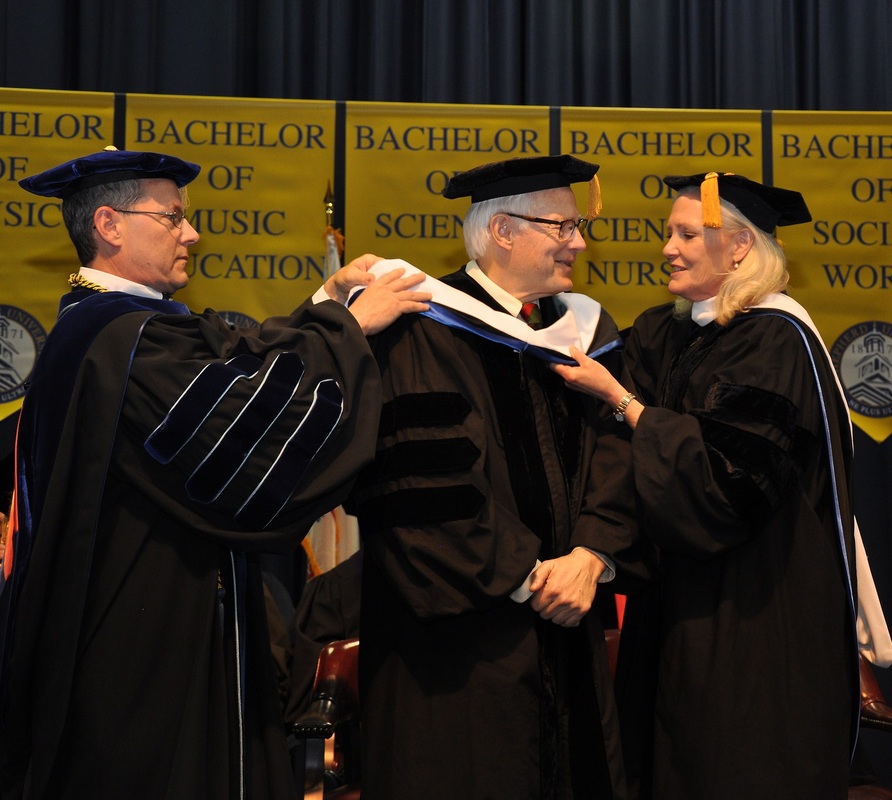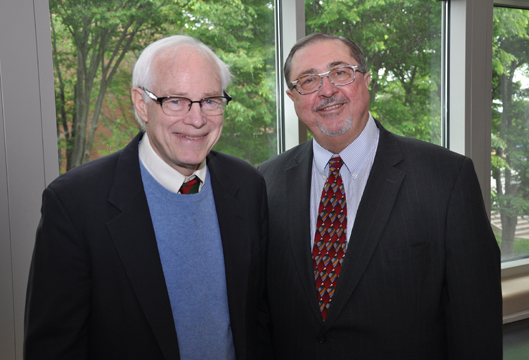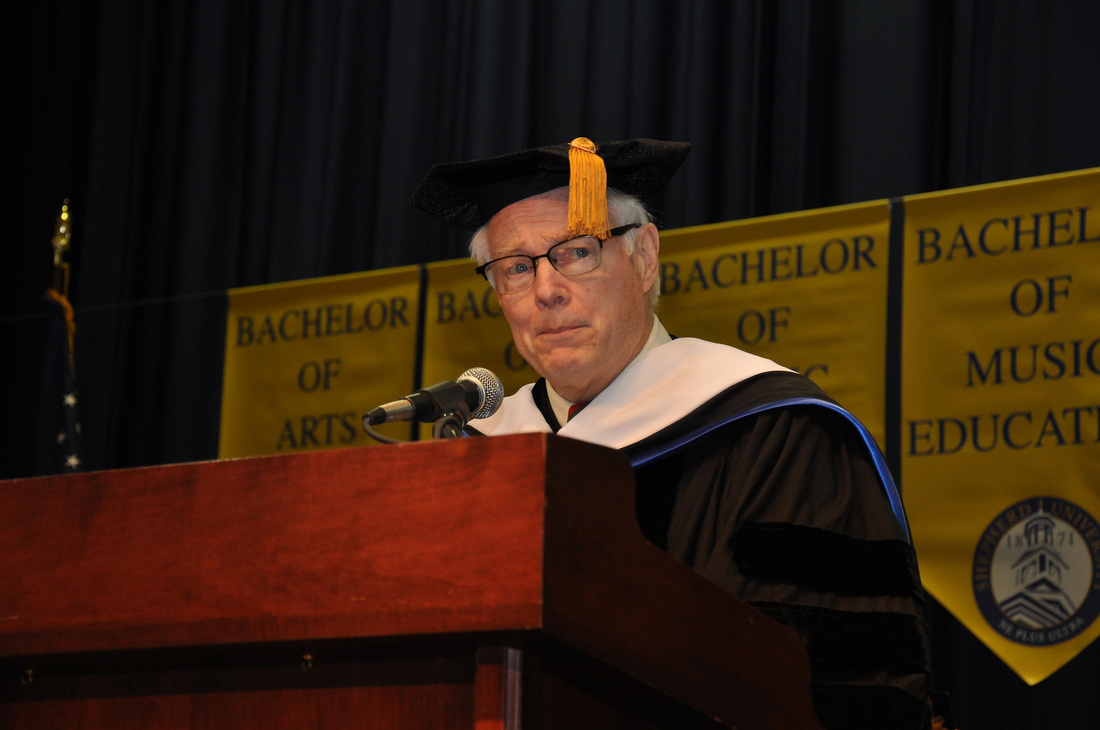While Mr. Leach titled his remarks: “Democracy is on Trial,” the phrase that struck me like a bolt of lightning was his characterization of a “political-ideological complex” that threatens this republic. He explained how this dangerous new complex developed. This timely address needs to be heard all across the nation. President Hendrix, trustees, faculty and, most of all, members and families of the class of 2016.
I am honored that your extraordinary president has asked me to address the challenges contemporary politics pose to this impressive congregation of graduates. The dilemma of America today is that we have an unprecedented abundance of leadership in commerce, science, the arts and every profession, including all facets of the academy, but the political system remains hamstrung by debilitating partisanship and uncompromising ideological cleavages. President Eisenhower warned 55 years ago about the dangers of a military-industrial complex. Today my worry is about the rise of a political-ideological complex. Ideologues, especially those with deep pockets, use politicians as pawns while politicians use ideologues as enablers of personal ambition. This reinforcing set of mutual interests has little to do with the common good and much to do with the break-down in civility in public life. For many, concern for civility seems either unimportant or sanctimonious. Actually civility is an enduring virtue of civilized society. At issue is how individuals inter-relate in community and how societies make decisions that affect their place in relation to all others. Civility is not simply or principally about manners. It doesn’t mean that spirited advocacy is to be avoided. Indeed, argumentation is a social good. Without argumentation there is a tendency to dogmatism, even tyranny. What civility does require is a willingness to consider respectfully the views of others, with an understanding that we are all connected and rely on each other. All Americans, especially those in governance positions, must continually bear in mind the implications of Einstein’s sobering observation that splitting the atom has changed everything except our way of thinking. In this new millennium when for the first time in history terrorism has been globalized and weapons of mass destruction have spread to every continent in the northern hemisphere, the need for listening carefully to friend and foe has never been more important. Seldom is there only one proper path determinable by one individual, one political party, or one ideological movement. Over most of our history our democratic processes operated under this assumption that decision makers would listen respectfully to and gain perspective from those who differed as well as those who shared the same basic approach. The art of politics was considered the art of compromise. What is so awkward on Capitol Hill today is that the practice of politics has increasingly become the art of intransigence. Representatives of the people spend inordinate time dialing for dollars and attending single dimensioned party caucuses. St. Paul once suggested that we all look through a glass darkly. Metaphorically, Paul may have made the ultimate case for humility. While faith may be absolute, Paul suggests that man simply does not have the capacity to know the will of God or apply perfectly the wisdom of His apostles on earth. Unfortunately, in the jungle of modern politics too many false prophets pontificate confidently about public policy the way medicine men in the 19th Century peddled elixirs at county fairs that they claimed would cure pains of the body. Whether a person knows a great deal or very little, caution should be taken about being certain of very much. To know a lot may be a preferable condition to knowing little, but the best and the brightest are not immune from great mistakes. Imperfect judgment characterizes the human condition. That is why humility is such a valued character trait, and why civility is such an important part of an interconnected world polity. As individuals each of us tries to make sense of our own odysseys through life. Our universe is small in relation not only to the solar system but the communities in which we live. But wherever we might be, we are affected by global events, whether related to the challenges of national security or the global hiring hall. In this insecure geo-political environment, what better way is there to apply perspective to our times than to study the history of prior times? To look presciently forward we have no choice except to look carefully back. History has a circular quality. It tends to repeat, sometimes rewind. Wisdom, by contrast is linear. Smart people, parents tell their children, learn from their own mistakes. A really smart person, a corollary might suggest, learns from the mistakes of others. And a sage gleans great truths from the wise as well as mistaken steps of those who came before. Hence it is helpful to remind ourselves about the extraordinary nature of our heritage as we try to pick up the pieces from some miscues we have made in the relatively recently past. The story of America began with the faith-based values of the Puritans who aspired to build a “city on a hill.” They began construction of such a city and succeeding generations helped enlighten it with tolerance. When in the 18th Century the American republic took shape in the wake of the Revolutionary War, questions of moral philosophy loomed large. To counter kingly despotism and insure democratic accountability, the founders dwelled on the frailty of human nature and opted to form a fledgling democracy that bifurcated and decentralized political power. Following Montesquieu, they established a checks and balances system in which power was split between Congress, the Executive branch, and the Judiciary. This separation of powers model was then repeated in similarly tripartite ways at state, county, and city levels, thereby causing a perpetual tension between and within levels as well as branches of government. The assumption of our founders was that Constitutional governance would protect the people from tyranny and limit corruption. They assumed that representatives of the people could work constructively together to resolve differences of judgment in publicly acceptable ways. No founder ever envisioned that elected representatives would advance tactics to make government dysfunctional or imagined the concept of gridlock. The making of public decisions, Washington and Madison advised, should always be in the national interest for the common good. As we look at the challenges that our founders faced so wisely and match it with the era two centuries later that we, with good reason, label “the greatest generation” when our fathers and grandfathers defeated fascism in the greatest war in history and then prevailed over communism in the Cold War, we now have to ponder whether politicians in the follow-on generation have brought us into an unforeseen historical thicket. The evidence so far marshalled in this primary season, which energetically unfolds in a few days here in West Virginia, is that the public has made clear its lack of confidence in our 21s Century political establishment. The case for dissent is understandable. We have, after all, just gone through a man-made recession, the two longest and arguably most enervating wars in our history, and have entered a second Gilded Age where the gap between the very wealthiest Americans and the less well-off has widened. In this circumstance, the call for a new generation of political leadership is present throughout the country. The case for change is compelling but the case for radicalism is not. The country is simply crying out for a new social compact rooted in concern for the common good, what the British utilitarians in the 19th Century referred to as the greatest good of the greatest number. Rather than interest groups, the American public wants its concerns to preoccupy those who walk the halls of Congress. It believes these concerns cannot continue to be ignored in the political process by the principal balancing institution in our Constitutional system, the Supreme Court, which six years ago issued the second most confounding ruling in its history. Brazenly, in what is known as Citizens United, the Court employed parallel logic to the syllogism embedded in the most repugnant ruling our highest court ever made, the 1857 Dred Scott decision. To justify slavery, the 19th Century Court defined a class of human beings as private property that could be bought and sold. To magnify corporate power a century and a half later, it defined corporations, which are a class of private property, as human beings vested with rights to infuse unconstrained amounts of money into the political process. Ironies abound. To advance the sophistic argument that 1st Amendment rights apply to corporations and that more money in politics equates to more democracy, the Court had to employ a linguistic gyration. It presumed that “money” is “speech” and that a “corporation” is an “individual.” But where in any dictionary or in any founding documents are these equivalencies made? Democracy is on trial. The Court’s twisted linguistics and skewed logic has undercut American values and caused elected representatives to become less in synch with the voters who elect them than the corporatist oligarchy that funds their campaigns. A tragic upshot of money-centered campaigns is that the highest levels of elective office are now open principally to candidates of substantial wealth or candidates willing to commit their elective souls to those who have the greatest financial interest in governmental policies. The only way equal opportunity to citizens can be established in the political domain is for campaign finance reform to be adopted, including the overturning of Citizens United and related rulings. American civilization requires that equal opportunity be granted citizens who aspire to serve their country politically with an independent conscience. The Constitution, after all, begins “We the people” rather than “We the corporations.” The issue isn’t conservative or liberal; Republican or Democratic. It is democracy itself. Our revolutionary experiment with representative government had flaws that were largely repaired in the 19th and 20th Centuries as America came to lead the world in thought and action. In this new century, American achievements in science and technology have been impressive. The same cannot be said for the international pathways that our government has followed or the partisan culture that has taken grip in the nation's capital. The country which is expressing such understandable discontent at the polls this year is in need of a unifying uplift. As your graduation speaker, my charge therefore is that you commit to help lead a renewal of the American spirit. My advice, molded in an age that admittedly speaks less sensitively to younger generations than perhaps any in history, is to deepen your personal perspectives by listening to and respecting those who differ. There is simply no credible case for Americans to war on each other. With the exception of hate engendered advocacy, the country is best off when a wide variety of views are placed on the public table. It is o.k. to be very conservative and very liberal, or somewhat left or right of center, but be cautious of anyone or any ideology that is intolerant of other people or other philosophical perspectives. Mutual trust cannot be developed without mutual understanding. Beyond the narrowness that politics often is, it is not crucial that you, the class of 2016, have values precisely like those of your parents and grandparents. Times change. Choices widen. But it is important that you develop an appreciation of the transcendent and the disciplining role of conscience. So respect your heritage and go forth in faith, with the spirited assurance that you can make a difference, never losing sight of the goal we share with all humanity – the creation of many cities on many hills inspired by many points of light. Thank you. Comments are closed.
|
Welcome to the Byrd Center Blog! We share content here including research from our archival collections, articles from our director, and information on upcoming events.
Categories
All
Archives
July 2023
|
Our Mission: |
The Byrd Center advances representative democracy by promoting a better understanding of the United States Congress and the Constitution through programs and research that engage citizens.
|
Copyright © Robert C. Byrd Center for Congressional History and Education
|




 RSS Feed
RSS Feed
